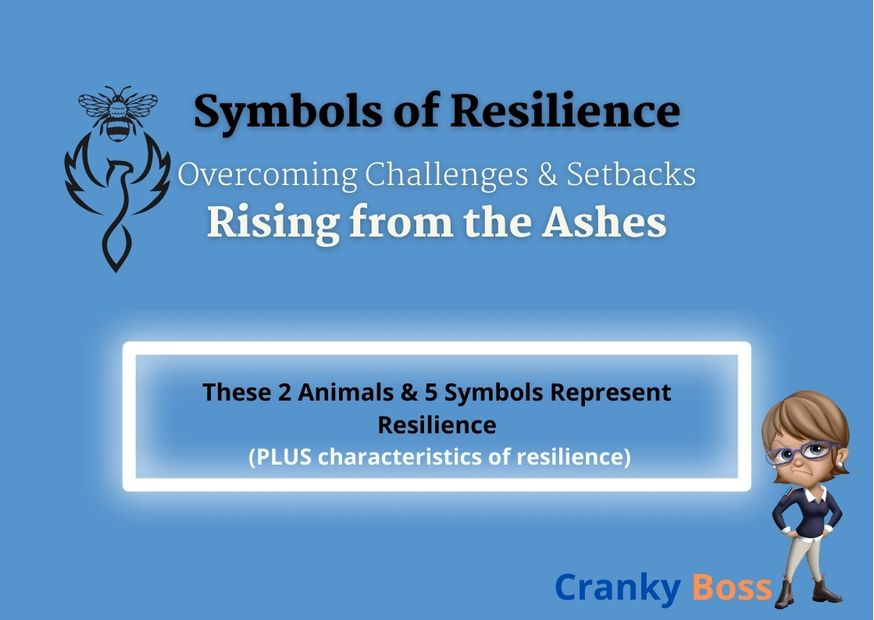One animal commonly associated with resilience is the phoenix. While the phoenix is a mythical creature rather than a real animal, it is often used as a symbol of resilience and rebirth. According to legend, the phoenix is a bird that cyclically regenerates or is reborn from its ashes, rising from the ashes of its predecessor. This symbolism is often employed to convey the idea of overcoming challenges, adversity, and setbacks, emerging stronger and renewed.

In the animal kingdom, the honeybee is also considered a symbol of resilience. Honeybees work together in colonies, facing various challenges such as harsh weather conditions, predators, and diseases. Despite these challenges, honeybees exhibit remarkable resilience in maintaining their colonies and adapting to changing circumstances. The collective effort and adaptability of honeybee colonies make them a symbol of resilience in the natural world.

Whats the definition of resilience?
Resilience is the ability to bounce back from adversity, recover quickly from setbacks, adapt to change, and endure challenging situations. It involves the capacity to withstand and overcome difficult circumstances, learn from experiences, and emerge stronger and more capable.
Resilience is not just about withstanding stress or hardship; it also includes the ability to maintain a positive mindset, problem-solve effectively, and navigate through uncertainties with a sense of adaptability and perseverance. In various contexts, resilience can refer to individual, community, or organizational capacities to cope with and thrive in the face of adversity.
Why do we need to be resilient?
Resilience empowers individuals to face life’s uncertainties, navigate difficulties, and emerge from challenges with a sense of strength and adaptability. It is a valuable trait that contributes to overall well-being and success in various aspects of life.
How do you pronounce resilience?
Resilience often misspelt resilients is pronounced as follows:
Rih- zil-ee-uhns
Resilience in Business
Resilience is like a superpower for business owners—it’s the ability to stay strong and keep going, even when facing tough times. The ability to not give up or quit on a bad day. In the business world, where challenges and changes are part of the game, resilience is your secret weapon.
As a business owner, you need resilience to bounce back from setbacks, adapt to unexpected situations, and make your business not just survive but thrive. It’s like having a sturdy ship that can navigate stormy seas and come out on the other side even stronger.
Resilience isn’t just about getting through tough times; it’s about using those experiences to learn, grow, and make your business more successful in the long run.
What are the characteristics of resilience?
Resilience is a complex and multifaceted trait that involves the ability to bounce back from adversity, cope with stress, and adapt positively to challenging situations.
Common characteristics of resilience
Different individuals may express resilience in various ways, but some common characteristics include:
- Optimism and Positive Outlook: Resilient individuals tend to maintain a positive attitude even in the face of challenges. They focus on finding solutions rather than dwelling on problems.
- Adaptability: Resilient people are flexible and adaptable. They can adjust their strategies and behaviors to effectively deal with managing changing circumstances.
- Problem-Solving Skills: Resilient individuals are often good problem solvers. They approach challenges with a proactive mindset, seeking constructive solutions rather than getting overwhelmed by difficulties.
- Social Support: Having a strong support system is crucial for resilience. Resilient individuals often have a network of supportive relationships, including friends, family, and colleagues, that they can turn to during tough times. In business it is equally the same. Having a strong business network and building meaningful connections, contributes to a successful business.
- Emotional Regulation: Resilient people can manage their emotions effectively. They acknowledge their feelings, but they also have the ability to regulate and control their emotional responses to stressors.
- Self-Confidence: Resilience is often linked to a sense of self-efficacy and confidence. Believing in one’s ability to navigate challenges contributes to a resilient mindset.
- Sense of Purpose: Resilient individuals often have a clear sense of purpose and meaning in their lives. This overarching goal or purpose can help provide direction and motivation during difficult times.
- Perseverance and Determination: Resilient people demonstrate perseverance. They are willing to keep going despite setbacks and obstacles, maintaining a sense of determination and commitment to their goals.
- Self-Reflection: Resilience involves the ability to reflect on experiences and learn from them. Resilient individuals can gain insights from their past challenges, allowing them to adapt and grow. Self-reflection is a key component of resilience as it enables individuals to assess their reactions, identify strengths and weaknesses, and develop coping strategies.
How does empathy build resilience?
I speak of empathy because I strongly believe this is one of the key traits in becoming a successful leader. It is a key element of emotional intelligence.
Empathy and Resilience
Empathy can play a crucial role in building resilience by fostering supportive relationships and providing individuals with a sense of connection and understanding. Here’s how empathy contributes to resilience. This is in both in a personal and a work setting.
- Social Support: Empathy encourages individuals to connect with others on an emotional level. When someone is going through a challenging time, feeling understood and supported by others creates a sense of belonging and strengthens their social support network. Knowing that others care and empathize with their struggles can be a powerful source of resilience.
- Validation of Emotions: Empathy involves recognizing and understanding the emotions of others. When individuals feel their emotions are acknowledged and validated, it can promote emotional well-being. This validation can be crucial in the face of adversity, helping people feel more confident in their ability to cope with difficult situations.
- Reduced Feelings of Isolation: Facing challenges can sometimes lead to feelings of isolation. Empathy bridges this gap by creating connections and fostering a sense of community. Knowing that others have faced similar difficulties and have come through them can alleviate the sense of being alone in one’s struggles.
- Enhanced Coping Strategies: Empathy can provide valuable insights into the perspectives and experiences of others. By understanding different coping strategies and learning from the ways others have overcome adversity, individuals can expand their own repertoire of coping mechanisms. This adaptability contributes to greater resilience.
- Building Trust: Empathy helps build trust in relationships. Trust is a foundational element of strong support networks, and resilient individuals often have trustworthy connections they can rely on during tough times. Trust fosters an environment where individuals feel safe and comfortable seeking help or sharing their challenges.
- Promoting Emotional Intelligence: Empathy is a key component of emotional intelligence. Developing emotional intelligence helps individuals better understand and manage their own emotions and those of others. This self-awareness and understanding contribute to a more resilient mindset by enabling individuals to navigate challenges with greater emotional regulation.
What symbolizes resilience?
Commonly associated symbols represent the ability to overcome adversity, bounce back from challenges, and emerge stronger.
Symbols of Resilience
Some widely recognized symbols of resilience include:
- Lotus Flower: The lotus flower is a symbol of beauty, purity, and resilience. It grows in muddy waters, yet its petals emerge clean and unblemished. People often use the lotus to convey the idea that challenging and difficult circumstances can give rise to beauty and strength.

- Anchor: An anchor is a symbol of stability and steadfastness. In the face of storms and turbulent waters, an anchor keeps a ship grounded. It is often used as a metaphor for resilience, representing the ability to stay grounded and weather life’s challenges.

- Oak Tree: The oak tree is known for its strength and longevity. It withstands storms and harsh weather, symbolizing resilience in the face of challenges. The saying “mighty oaks from little acorns grow” emphasizes the idea of gradual growth and strength over time.

- Turtle: In some cultures, the turtle is a symbol of resilience and longevity. Its ability to retract into its shell provides a metaphor for facing challenges by withdrawing temporarily and then emerging again when the time is right.

- Rock or Mountain: Rocks and mountains are often used as symbols of strength and stability. They endure the test of time and weather, representing resilience in the face of adversity. Hence when we often refer to our partners as the “rock” of our life.

These symbols, rich in meaning, often inspire and remind individuals of their inner strength during challenging times. The choice of symbol may vary depending on cultural, personal, or contextual preferences.
What best describes the resiliency skill of assertive communication?
Assertive communication is an important aspect of resilience, as it involves expressing one’s needs, thoughts, and feelings in a direct and honest manner while respecting the rights and opinions of others. It’s important however to distinguish between assertive and aggressive. This is also relevant in the workplace and business. Here’s how assertive communication contributes to resilience:
- Self-Advocacy: Assertive communication allows individuals to advocate for themselves, expressing their needs and boundaries clearly. Navigating challenges and ensuring acknowledgment and addressal of one’s concerns is crucial for this skill.
- Conflict Resolution: Resilient individuals often possess effective conflict resolution skills, and assertive communication is a key component of resolving conflicts. It involves expressing concerns, actively listening to others, and working towards mutually agreeable solutions. This is particularly important in a workplace setting.
- Boundaries: Assertiveness helps individuals establish and maintain healthy boundaries. Resilience involves knowing and communicating one’s limits, which contributes to overall well-being and the ability to bounce back from adversity.
- Emotional Expression: Resilience requires acknowledging and managing emotions. Assertive communication allows individuals to express their feelings openly and constructively, fostering emotional intelligence and self-awareness.
- Problem-Solving: Assertive communicators are more likely to engage in effective problem-solving. Resilient individuals approach challenges with a problem-solving mindset, actively seeking solutions and adapting to changing circumstances.
- Effective Collaboration: Resilience often involves the ability to work well with others and seek support when needed. Assertive communication fosters effective collaboration by promoting clear and open dialogue within relationships.
- Stress Reduction: Assertiveness can contribute to stress reduction. Individuals with resilience better equip themselves to communicate their needs and manage stressors effectively, leading to improved mental and emotional well-being.
- Confidence and Self-Esteem: Confidence and healthy self-esteem are linked to assertive communication. Resilient individuals have a positive self-image and are more likely to face challenges with a sense of self-assurance.
Final Thoughts
Resilience stands as a dynamic and essential quality that empowers individuals to confront life’s challenges with strength, adaptability, and a positive mindset. Rooted in the ability to bounce back from setbacks, resilience involves learning from experiences, maintaining emotional well-being, and fostering a sense of purpose. Whether in personal endeavors or within the complexities of the workplace, resilience enables individuals to not only endure difficulties but also to thrive and evolve.
While the phoenix is a mythical concept and not a tangible entity capable of self-reflection, the symbolism associated with it resonates with the qualities and characteristics often attributed to resilient individuals.

